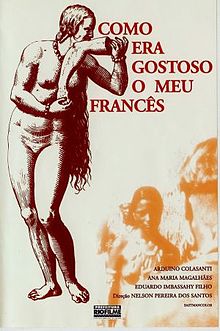- How Tasty Was My Little Frenchman
-
Como Era Gostoso o Meu Francês 
Directed by Nelson Pereira dos Santos Produced by Luiz Carlos Barreto, K.M. Eckstein, Nelson Pereira dos Santos, César Thedim Written by Humberto Mauro (Tupi dialogues) and Nelson Pereira dos Santos Starring Arduíno Colassanti
Ana Maria Magalhães
Eduardo Imbassahy Filho
Manfredo Colassanti
José Kléber
Gabriel ArchanjoMusic by Guilherme Magalhães Vaz and José Rodrix Cinematography Dib Lufti Editing by Carlos Alberto Camuyrano Distributed by Condor Filmes Release date(s) 1971 Running time 84 minutes Country Brazil Language Portuguese, Tupi ,French How Tasty Was My Little Frenchman (Portuguese: Como Era Gostoso o Meu Francês) is a Brazilian black comedy directed by Nelson Pereira dos Santos released in 1971.
Almost all of the dialogue in the film was written in the Tupi language. The actors and actresses who portrayed the Tupinambas wore historically correct attire resulting in a considerable amount of historically correct nudity and semi-nudity in many scenes.
The location for the entire film was the Bay of Ilha Grande, which has 365 islands and whose shores comprise the Angra dos Reis and Parati municipalities in the state of Rio de Janeiro.
Contents
Plot
In 1594 Brazil rival French and Portuguese settlers are utilizing the indigenous people as allies in their struggle to establish control. The Tupinambas, who live in the Guanabara Bay area, are allied with the French, while the Tupiniquins are allied with the Portuguese.
A Frenchman who has been captured by the Portuguese is then captured by the Tupinambás after they attack and kill a group of Portuguese. The Tupinambas don't believe that the Frenchman was a prisoner of the Portuguese they have killed, and the Chief thinks he is Portuguese because "No Frenchman would shoot at the Tupinamba." The tribe's shaman predicted they would find a strong Portuguese man to cannibalize as revenge for the chief's brother being killed by a Portuguese musket ball. Now they have one.
However, the Frenchman is allowed free run of the village area, is eventually provided with a "wife," and adopts traditional Tupinamba attire in place of his Western clothes.
Another Frenchman comes to the village and tells the Tupinambas that their prisoner is indeed Portuguese—he then promises the outraged Frenchman that he will tell the Tupinambas the truth when the Frenchman finds a hidden treasure that another European has hidden in the area.
The relationship between the Frenchman and his Tupinanba "wife" remains enigmatic. It is unclear for most of the movie if she intends to save him from the group that wants to eat him, or if she has been assigned to win his trust and prevent him from escaping.
After using cannon powder to defeat the Tupiniquins in battle, the Tupinambas eat the Frenchman as celebration.
In the last seconds of his life the Frenchman refuses to play along with the ceremonial script that the Tupinambas expect him to follow and instead angrily (and loudly) tells the Tupinambas that his death will not revitalize them (as his death and the subsequent cannibal feast is intended to do) but rather will doom them all to extermination.
The movie ends with a postscript that reveals that the Tupinambas were exterminated within a relatively short period of time after they killed and ate the "tasty" Frenchman.
Cast
- Arduíno Colassanti - The Frenchman
- Ana Maria Magalhães - Seboipepe
- Eduardo Imbassahy Filho - Cunhambebe
- Manfredo Colassanti - The tradesman
- José Kléber - Ipiraguaçu
- Gabriel Archanjo - Mbiratata
Awards
- Brazilian Cinema Festival of Brasília. Best Screenplay (Nelson Pereira dos Santos). 1971
- Brazilian Cinema Festival of Brasília. Best Dialog (Nelson Pereira dos Santos and Humberto Mauro). 1971
- Brazilian Cinema Festival of Brasília. Best Cenograph (Régis Monteiro). 1971
- Berlin Film Festival. Golden Bear. 1971 (nominated)[1]
- São Paulo Association of Art Critics Awards. Most Promising Actress (Ana Maria Magalhães). 1973
References
- ^ "IMDB.com: Awards for How Tasty Was My Little Frenchman". imdb.com. http://www.imdb.com/title/tt0066936/awards. Retrieved 2010-03-13.
External links
Cinema of Brazil  Categories:
Categories:- Brazilian films
- 1970s horror films
- 1971 films
- Portuguese-language films
- Films directed by Nelson Pereira dos Santos
- Tupi-language films
Wikimedia Foundation. 2010.
